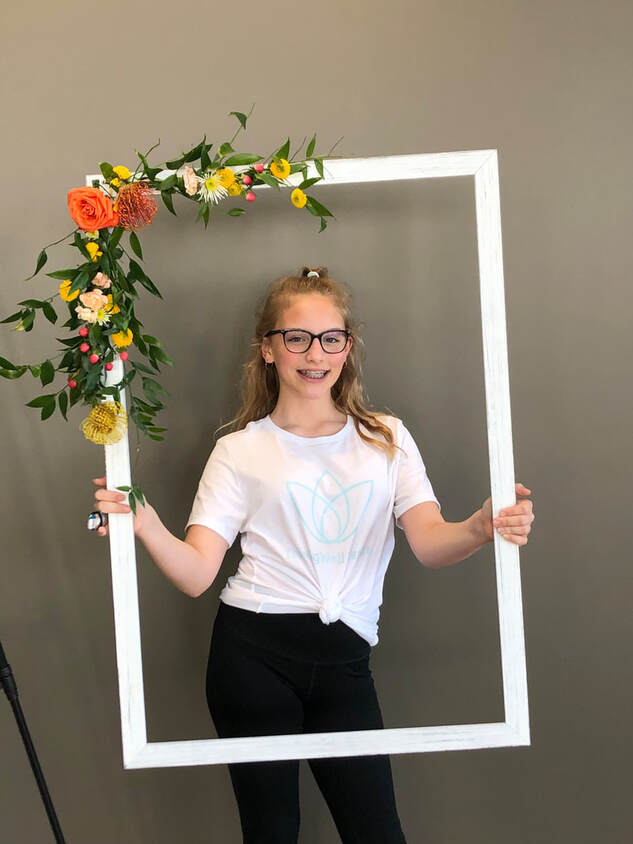|
A lot of people ask me about managing anxiety. As a psychotherapist, I recommend first ruling out a medical condition. A simple visit to your primary care doc and a fasting blood draw can help you determine if your anxiety symptoms are related to an underlying physical condition or vitamin deficiency or if they're stress induced.
My second line of defense is to focus on self-care practices. When clients come in for therapy, no matter what the issue is, I find it's important to assess how their fundamental self-care practices might be impacting their ability to cope. When we're sleeping well, eating clean and moving our bodies we expand our distress tolerance and our emotional reactivity decreases. Healthy self-care helps us create a well of resiliency that we can draw from which helps us pause and make conscious decisions about how to respond and react. If we're not sleeping well, our diet is poor and we don't make exercise a priority, we hit a stressor and we tend to fall all the way down the rabbit hole. Anxiety increases when we feel uncertainty or have the perception of being trapped. I coach clients to reframe their thinking and free up all the options in their mind so they can pop the balloon of worry and stress. When we use techniques like Cognitive Behavioral Therapy, we learn how to stop our thought process and think carefully about whether or not the thought we're having is based in reality or distortion. Many times anxious thoughts are hinged on an attachment to a hypothetical 'what if' instead of a reality based thought based in evidence and truth. I also remind clients that their anticipatory anxiety is typically greater than the actual event. Whatever we imagine about what's coming next is typically much worse than whatever actually occurs. If we can learn to move away from that state of anticipatory fear and drop into evidence based thinking, our anxiety will decrease. Mindfulness is another great strategy to help people feel less anxious. When we engage our senses and move into an awareness of the now, we bring ourselves to a feeling of calm and gratitude. Most anxiety stems from worries about what's next. Mindfulness invites us to bring our attention back to the present moment and simple practices like meditation or breath work can help us return to a sense of groundedness and peace. I find many clients spend a lot of time in an imaginary dress rehearsal of what could happen in their future. The hard part is, this way of thinking just robs us of the joy of the now. If we should have to face something stressful in our future, no amount of imagining how it will feel or how we will cope with it will ever change the impact if it really does occur. Instead we need to shift from 'what if' to 'what is' and allow ourselves to focus on the moment we're in. Acceptance Commitment Therapy invites us to learn strategies to accept and tolerate stress and anxiety, set it next to us and bring our focus to what we want to commit to. This is best illustrated in the example of being a bus driver. Imagine your job everyday is to drive a bus. You start your day off in an empty bus, buckle your seatbelt and head off on your route. Everything is going great! Until you pick up those noisy "thought" passengers. They get louder and louder and it becomes challenging for you to focus on your job. You have 2 choices here. You can stop your bus and go back there and wrestle it out with those noisy, anxious thought passengers and throw them off your bus, or you can accept that those thoughts get on and off your bus everyday and instead bring your attention to what's in front of you and commit to disengaging from them and finish your route. When we learn to accept a certain level of discomfort or stress and make a conscious choice to align our attention to what we want to commit to, we regain a sense of control and feel less victimized by our anxiety. Anxiety can be tricky. Sometimes it improves when we take a closer look at it under a therapy microscope and unpack it to see what's really inside. Other anxious thoughts dissipate faster when we consciously decide not to engage with them and instead bring our awareness to something else. Many times, mild anxiety can decrease by increasing self-compassion. When we normalize that everyone feels a little anxious from time to time, we feel less attached to the thoughts and symptoms and the anxiety lessens naturally. However, if you find that your anxiety symptoms start to impede your functioning, then it's time to seek more support. If your anxiety keeps you awake at night or impacts your ability to concentrate, it might be time to see a therapist to help you build a better coping toolbox.
0 Comments
 I asked my 13 year old daughter what I should blog about this week and she said "I want to write your blog this week!" Here are Hannah's thoughts on what helps her thrive. She titled her guest blog: Cleanliness. "How you live in your house, how you act when you leave and even how healthy you are all contribute to a simple word we hear all day long. That word is cleanliness. Coming from a teens perspective keeping your room clean is one of the secrets to a clear mind and a clearer future ahead. That seems farfetched but, cleaning your surroundings and living in cleanliness brings more feelings of accomplishment and positivity into your work and life and even can boost your confidence. Coming home to a clean space also can help you unwind and feel serenity in a peaceful resting place for the night. Having a clean room can also reduce stress. When you already have a lot on your plate, then want to go to sleep, you look around and see how much you still have to do not having everything tucked away. You are probably thinking you don’t have the time to clean your room once a week, but so many daily tasks can be done while tidying up. New show you want to watch? Fold some laundry. Have to cook dinner? Clean up before you cook so you are more inspired to cook. A clean kitchen makes after dinner clean up a lot easier. The key to always staying organized is that everything has a place. That way whenever it’s out of its place you can put it back instead of trying to find it a new home or just shoving it in your closet. You should be able to find anything you own in your room if you have a designated space for it. Overall, having a clean environment can effect your grades, work habits, social life, stress, and even how well you sleep. Waking up to a clean room jumpstarts your day and keeps you organized throughout. Coming home to a clean room can help you de-stress and relax for a good nights sleep. So, stop putting it off and get to cleaning!" Hannah really lives by this message (more than I do myself most of the time). She has a weekly routine down to a science. Every Sunday during the school year, she would tidy up her room and select 5 outfits for the week ahead. I noticed how calm she felt heading into a stressful week when she helped her future self by doing simple tasks ahead of time. She even "Marie Kondo-ed" my husbands t-shirts the other day! There's something super satisfying about creating order around you. Hannah's right - when we have a calm environment around us, we feel calmer inside too. I'm not sure I can achieve total order of my own dresser, but she's making me think twice about tidying up! |
AuthorMegan Gunnell, LMSW Founder & Director of the Thriving Well Institute, psychotherapist, retreat leader, speaker, writer and entrepreneur. Loves to experience the world through food, culture, art, music and travel. Believes whole-heartedly that practicing gratitude, self-care and mindfulness are the foundation of thriving and living in joy. Archives
September 2020
Categories |


 RSS Feed
RSS Feed
